This article has been reviewed according to Science X's editorial process and policies. Editors have highlighted the following attributes while ensuring the content's credibility:
fact-checked
trusted source
proofread
CBD as a painkiller: Efficacy not clinically proven

Cannabidiol (CBD) is marketed by some suppliers as a painkiller, e.g., for osteoarthritis of the knee. Animal experiments have shown that the substance, which is extracted from the hemp plant, has an anti-inflammatory and pain-relieving effect in arthritis. As pain researchers at MedUni Vienna were now able to show for the first time in humans, CBD is not effective as pain medication, even in high doses.
The results of the clinical study involving patients from the Department of Anesthesia, Intensive Care Medicine and Pain Medicine at MedUni Vienna and University Hospital Vienna have just been published in The Lancet Regional Health—Europe.
The study included 86 men and women with an average age of about 63 years who suffered from severe pain due degeneration of the knee joint (osteoarthritis). While half of the patients received high-dose cannabidiol (CBD) by the mouth, the other group was given a placebo that was not recognizable as such, i.e., a drug without an active ingredient.
The strictly controlled study period of eight weeks showed that CBD did not have a stronger pain-relieving effect than the placebo. "This means that CBD is not an alternative for pain therapy for osteoarthritis of the knee, so the search for more effective options must continue," says Sibylle Pramhas (Division of Special Anesthesia and Pain Medicine, Department of Anesthesia, General Intensive Care Medicine and Pain Therapy at MedUni Vienna and University Hospital Vienna), first author of the study.
Currently, knee pain associated with osteoarthritis is treated with analgesics such as diclofenac, ibuprofen and/or tramadol. Side effects, but also contraindications due to the mostly elderly patients affected, are proving to be major challenges. The analgesic effect of CBD shown in animal studies could have provided a new treatment option, but clinical studies with sufficiently high CBD doses have so far been missing.
"Our study is the first to provide solid information on the lack of analgesic potential of CBD in a common chronic pain condition, due to the comparatively high oral dosage and the long observation period," says Pramhas. Pramhas and the MedUni Vienna research team point out that if this potential cannot be demonstrated even with high-dose oral medication, then skepticism is even more appropriate with CBD-containing painkillers for application to the skin.
Cannabidiol is a natural substance extracted from the hemp plant and is freely available for sale in the EU. CBD has no demonstrable intoxicating effect and is not subject to the Narcotics Act. Liver toxicity is a known side effect. In medicine, the active ingredient has currently only been sufficiently researched and approved under pharmaceutical law for the drug therapy of certain types of childhood epilepsy (Dravet syndrome, Lennox-Gastaut syndrome).
Future research will have to show whether other medical applications can be confirmed. "According to our study, pain such as that caused by knee osteoarthritis is not one of them," concludes Pramhas.
More information: Sibylle Pramhas et al, Oral cannabidiol (CBD) as add-on to paracetamol for painful chronic osteoarthritis of the knee: a randomized, double-blind, placebo-controlled clinical trial, The Lancet Regional Health—Europe (2023). DOI: 10.1016/j.lanepe.2023.100777

















